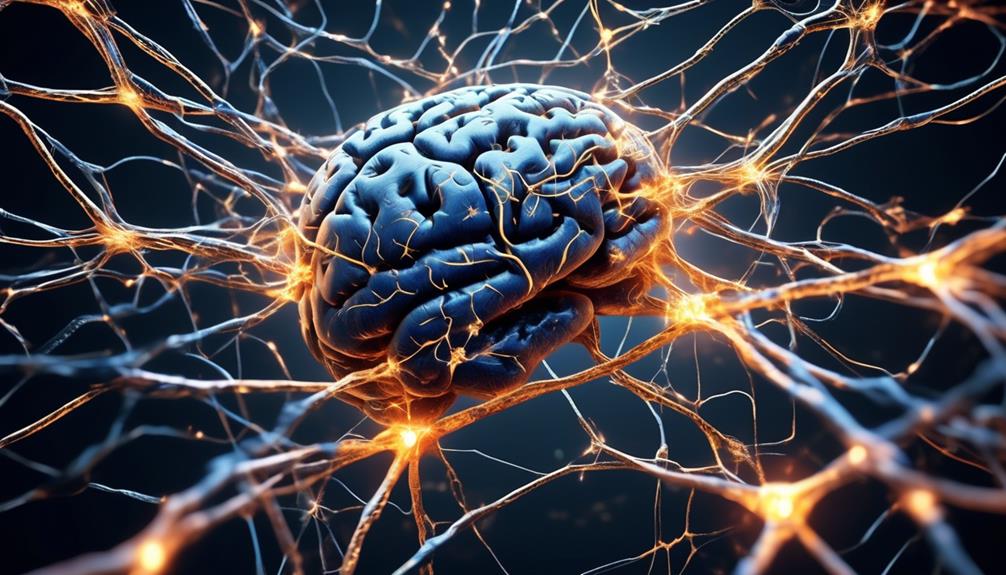As we explore the intricate link between stress and hallucinations, it is evident that the impact of stress on our mental well-being may be greater than we have realized before.
The question of whether stress can cause hallucinations is a complex one, with various factors at play. By examining how stress influences our perception and cognition, we can begin to unravel the mystery behind this intriguing connection.
Join us in uncovering the layers of this intriguing topic and discovering the potential implications it may have on our understanding of the human mind.
Key Takeaways
- Stress significantly impacts the occurrence and severity of hallucinations.
- Stress disrupts the balance of neurotransmitters in the brain, potentially leading to hallucinations.
- Sensory distortions as a result of stress can manifest as temporary auditory hallucinations.
- Seeking professional help is crucial in understanding and managing stress-induced hallucinations.
Stress and Hallucination Correlation
Stress has been shown to significantly impact the occurrence and severity of hallucinations in individuals with heightened levels of anxiety. The relationship between stress and hallucinations is intricate, often leading to heightened sensory sensitivity and altered perceptions. This connection underscores the importance of addressing stress in managing mental health conditions that involve hallucinations.
Understanding how stress contributes to hallucinations is crucial in developing effective treatment approaches. For individuals experiencing anxiety-induced hallucinations, interventions such as therapy, medication, and stress management techniques play a vital role in symptom alleviation. By identifying and addressing the root causes of stress and anxiety, it becomes possible to mitigate the occurrence and intensity of hallucinations.
Furthermore, stress management strategies like relaxation exercises and counseling can help individuals reduce both the frequency and impact of hallucinations. Seeking professional assistance is essential if stress-induced hallucinations persist or significantly disrupt daily activities. By recognizing the correlation between stress and hallucinations, individuals can take proactive steps towards improving their mental well-being.
Neurological Impact of Stress

Chronic exposure to high levels of stress can lead to significant alterations in brain structure and function, impacting various cognitive and emotional processes. When considering the neurological impact of stress, it's crucial to understand how stress can cause hallucinations:
- Disruption of Neurotransmitter Balance: Stress can disrupt the balance of neurotransmitters in the brain, potentially leading to symptoms like anxiety, depression, and even hallucinations.
- Changes in Brain Structure: Chronic stress can result in changes in brain structure, affecting areas responsible for emotional regulation and cognitive processes, which may contribute to hallucinations.
- Impairment of Memory and Cognitive Function: The release of stress hormones, such as cortisol, can impair memory and cognitive function, potentially leading to difficulties in concentration and decision-making.
- Mitigation through Stress Management Techniques: Effective stress management techniques such as relaxation exercises, regular physical activity, and seeking support from others can help mitigate the neurological impact of stress on hallucinations.
Stress-Induced Sensory Distortions
Experiencing sensory distortions as a result of stress can manifest in various forms, including temporary auditory hallucinations. When stress levels escalate, the mind can play tricks, leading to auditory perceptions that aren't rooted in reality. These stress-induced hallucinations are often linked to heightened anxiety levels, causing individuals to hear voices or sounds that aren't present.
Seeking professional intervention, like therapy or medication, can effectively manage and treat these hallucinations. Developing healthy coping mechanisms, such as relaxation techniques and stress management strategies, proves beneficial in reducing the occurrence of stress-induced sensory distortions.
Creating a supportive environment with a strong network of friends and family aids in managing these hallucinations. Addressing underlying mental health conditions, like anxiety or trauma disorders, can also alleviate stress-induced hallucinations. Practicing self-care and engaging in activities that promote relaxation and well-being are essential in managing stress levels and decreasing the likelihood of experiencing such hallucinations.
Coping Mechanisms for Stress-Related Hallucinations

When addressing stress-induced sensory distortions, implementing effective coping mechanisms becomes essential for managing stress-related hallucinations. Coping mechanisms play a crucial role in helping individuals navigate through the challenges posed by stress-induced hallucinations.
Here are some strategies to consider:
- Seek professional help: Consulting with a mental health professional can aid in understanding the root cause of hallucinations and devising a personalized treatment plan.
- Build a support system: Surrounding yourself with understanding friends and family members can offer emotional support during hallucination episodes.
- Practice stress management techniques: Engaging in stress-reducing activities like exercise, meditation, and deep breathing can help manage stress levels and reduce the frequency of hallucinations.
- Learn coping skills: Developing coping mechanisms and strategies with a therapist, such as grounding techniques and reality testing, can assist in dealing with stress-related hallucinations effectively.
Seeking Professional Help for Stress-Induced Hallucinations
Seeking professional assistance is paramount in effectively managing stress-induced hallucinations. When experiencing hallucinations due to stress, it's crucial to reach out to healthcare professionals for proper diagnosis and treatment. Consulting with a psychiatrist or therapist can lead to a personalized treatment plan tailored to address the underlying causes of the hallucinations. Through therapy, such as cognitive-behavioral therapy, individuals can learn coping strategies and stress management techniques to better deal with the effects of stress on their mental health.
In some cases, medication prescribed by a psychiatrist may be necessary to alleviate symptoms and manage stress-related hallucinations effectively. Regular check-ins with a mental health professional ensure ongoing support and adjustments to the treatment plan as needed.
Long-term residential treatment centers can also provide an ideal environment for comprehensive recovery by addressing stressors and triggers in a structured setting.
Frequently Asked Questions
What Do Stress Hallucinations Look Like?
When it comes to stress hallucinations, we're looking at manifestations that can encompass visual, auditory, or tactile sensations that aren't grounded in reality. These hallucinations might involve seeing things that aren't there, hearing voices that others can't, or feeling sensations with no external cause.
They can be fleeting or enduring, causing distress, anxiety, and fear. Seeking professional help is crucial if stress hallucinations emerge, as they might indicate an underlying mental health issue.
Can Severe Anxiety Cause Hallucinations?
Yes, severe anxiety can cause hallucinations.
When anxiety reaches high levels, it can trigger hallucinations, typically auditory or visual. These hallucinations can be a result of the body's stress response impacting the brain.
Seeking professional help is crucial for individuals experiencing severe anxiety and hallucinations. With appropriate treatment, individuals can learn to manage their anxiety and reduce the occurrence of hallucinations.
What Causes a Person to Hallucinate?
When we consider what causes a person to hallucinate, various factors come into play. These may include underlying mental health conditions like schizophrenia or bipolar disorder, sleep deprivation, certain medical issues such as epilepsy or brain tumors, substance abuse, and even specific medications.
Understanding the root cause of hallucinations is vital in providing appropriate treatment and support for those experiencing such symptoms.
How Long Do Stress Hallucinations Last?
Stress can trigger hallucinations, with varying durations based on individual responses and stress levels. These hallucinations might last for minutes to hours during acute stress or persist for days to weeks in chronic stress situations.
Seeking professional help and adopting coping strategies can reduce the duration. Understanding stress-induced hallucinations' duration can guide appropriate management and support mechanisms for those experiencing them.
Conclusion
In conclusion, while stress can exacerbate hallucinations, it isn't the sole cause.
It's essential to address underlying mental health issues and imbalances in conjunction with managing stress.
Seeking professional help and utilizing coping mechanisms are crucial steps in managing stress-induced hallucinations.
By taking a comprehensive approach to treatment, individuals can work towards recovery and improve their overall well-being.









